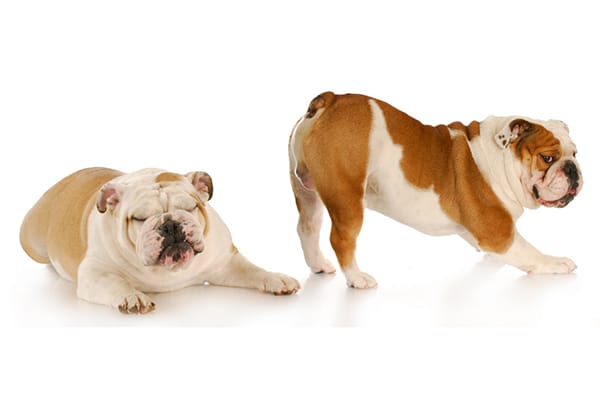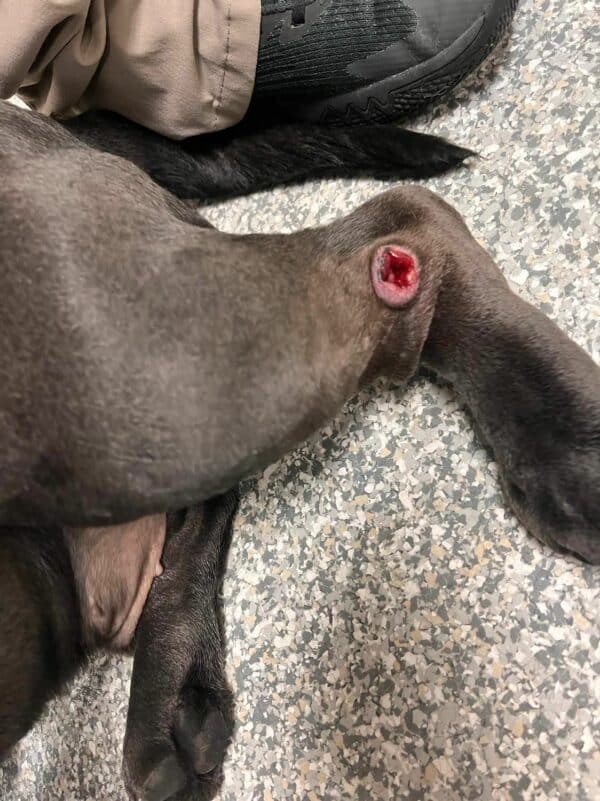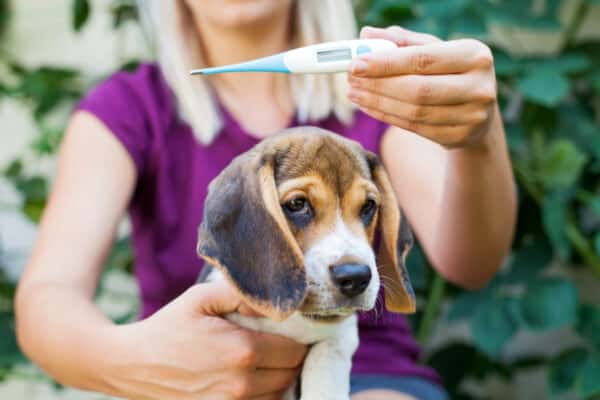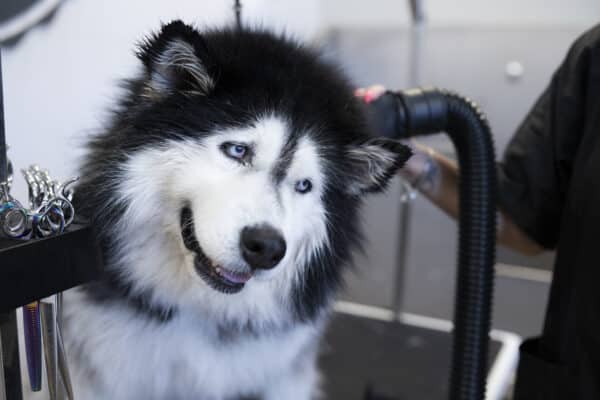Have you ever been cuddling on the couch with your dog and heard strange rumbling sounds coming from his tummy? Dog gas has some seriously gross side effects. Some dogs belch and others have the opposite problem — their stinky gas can clear a room! “Gas is a normal byproduct of digestion,” explains Tracey Jensen, DVM, Dipl. ABVP, founding partner of Wellington Veterinary Hospital in Wellington, Colorado. “When you hear the stomach gurgling, it’s gas and liquid. It’s the same kind of sounds you hear in a soda can, it just sounds different because it’s inside a dog. Dogs burp just like people do and they expel gas from the intestines in the form of flatulence.”
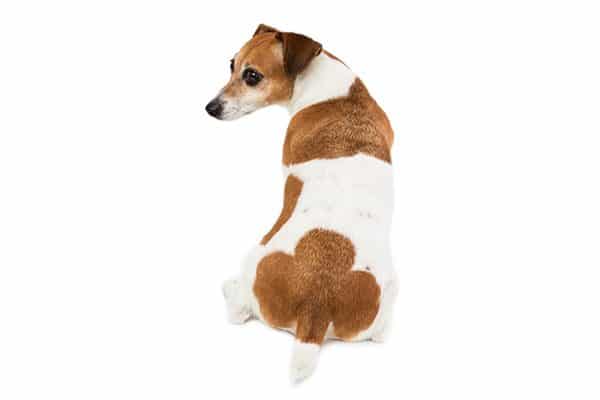
What’s normal and what isn’t when it comes to dog gas?
A small amount of stomach gurgling, burping or even farting is normal for most dogs, but excessive dog gas may signal a problem. “When it’s abnormal is when it’s excessive in volume or odor,” Dr. Jensen says. “When it’s consistent or persistent, it’s an indication of a variety of different things that warrant a visit to your veterinarian.”
Excessive dog gas may be caused by a less-than-ideal diet. If the ingredients in your dog’s food are hard for him to digest, it might result in burping, stomach gurgling or flatulence. Large amounts of dog gas or very foul-smelling dog gas may also be signs of issues like inflammatory bowel disease or intestinal parasites.
Diagnosing abnormal dog gas
If your dog is very gassy, your vet might want to run certain tests, especially a fecal test to check for parasites. When you go to the appointment, bring a fresh stool sample, the label from your dog’s food and any supplements or treats your dog gets at home.
Treating dog gas
If no overt issues are discovered as the cause of the dog gas, your vet might talk to you about switching your dog to a higher quality of the food for increased digestibility, and perhaps adding daily probiotics.
“In uncomplicated cases when there’s not an underlying medical problem, probiotics are fantastic,” Dr. Jensen advises in regards to treating dog gas. “Probiotics vary in their potency and in the evidence behind the specific preparation of probiotic, so definitely visit with your veterinarian so he or she can recommend which probiotics would be best for your pet.”
Although it’s safe to give your dog small amounts of plain yogurt as a healthy snack, he likely won’t reap many benefits from the probiotics found in yogurt. “Let’s face it, dogs and cats eat things that we would never dream of,” Dr. Jensen says. “They have pretty robust digestive systems. Because of that, the probiotics that you find in yogurt are just not potent enough to get to the intestinal tract of our domestic pets.”
Yes, dog gas is more prevalent in certain breeds!
Some dog breeds are more prone to gas simply because of the way they are built. The pushed-in faces of the brachycephalic breeds, including Boston Terriers, Boxers, Bulldogs and Pugs, causes these dogs to swallow air while they eat, which can lead to excess gas in their digestive tracts. If you have a short-nosed breed, you understand the reality of life with dog gas (good thing they’re so cute!).
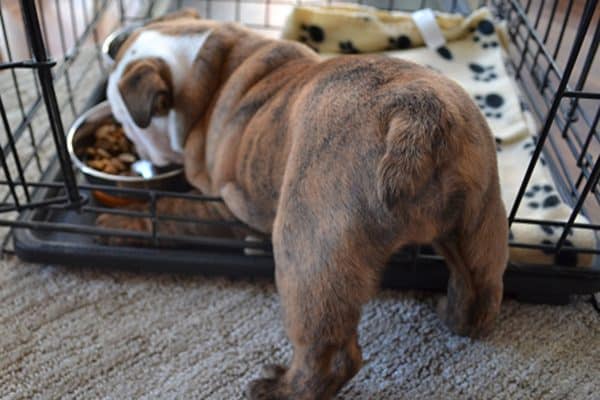
How to stop / help dog gas
There are some steps you can take to alleviate dog gas, especially in flat-faced breeds. First, make sure the food you’re feeding is very high quality and highly digestible. If you’re not sure, talk to your vet about it. Next, consider giving your dog daily probiotics.
Once those things are in place, take a look at the way your dog is eating. “Chewing is the first part of digestion,” Dr. Jensen says. “When dogs inhale their food, they bypass this important step. Dry food is easy to shovel into their mouths.”
You can also find special pet food bowls that are designed to help short-nosed dogs eat more comfortably and swallow less air, and there are even some brands of dry food designed with brachycephalic breeds in mind. “Pet food companies have addressed how those short-nosed dogs pick up their food and have created kibble to minimize the amount of air that those animals take in as part of picking up their food,” Dr. Jensen explains. “Smaller kibble sizes or kibbles with larger surface areas like those shaped like LifeSavers are preferable for dogs that do not chew their food.”
A few other tricks that might help cut down on swallowing air during mealtimes and reduce dog gas? Elevating the food bowls or adding some water to the food. “By adding a little water to the dry food, just like you would pour milk on cereal, aggressive eaters will ‘lap’ rather than ‘grab’ their food. When they use their tongues like ladles instead of shovels, they slow down and swallow less air.”
Read more about dog digestive issues on Dogster.com:
- Dog Diarrhea — At-Home Treatment and When to See a Vet
- All About Dog Gastrointestinal Issues — Diarrhea, Vomiting, Constipation and More
- What Is HGE (Hemorrhagic Gastroenteritis) in Dogs?
Experiencing gas yourself? See if it could be dairy intolerance >>
Featured Image Credit: WilleeCole | Thinkstock.

